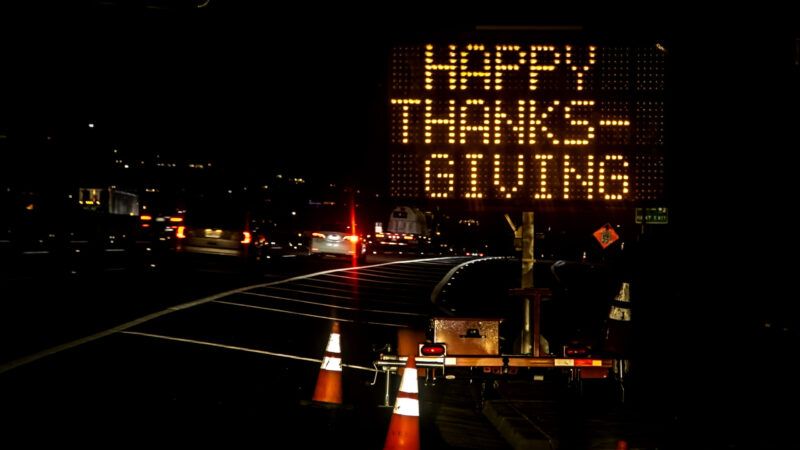Thanksgiving Traffic Shows the Highway Trust Fund Is Running on Empty
Federal gas taxes no longer cover the cost of highways, leaving taxpayers to fill a growing multibillion-dollar gap.

The American Automobile Association predicts that nearly 82 million Americans will travel more than 50 miles from home over Thanksgiving—a new record if it pans out. Almost all the travel increase, it projects, will be by car.
Whether you take a train, plane, or automobile to your holiday festivities, your income tax dollars are subsidizing drivers on the road. Most Americans assume that gas taxes and tolls fund highways. That used to be the case, but it's no longer true.
Gas taxes and user fees haven't fully funded the federal highway system since 2007. In 2021, Congress authorized roughly $181 billion in transfers to the highway account—money paid for by debt and general revenues.
Even with that added cash, the federal Highway Trust Fund (HTF) will run out of money again in 2027. By 2033, it will need an extra $250 billion from taxpayers. That's nearly $2,000 per American household over the next eight years.
The increased popularity of electric vehicles (E.V.s) contributes to the shortfall, as E.V. drivers don't pay gas taxes. But the biggest reason highways are costing taxpayers is a decrepit financing system that needs an overhaul.
User fees are the best way to fund the highway system, because they come closest to approximating market prices. Gas taxes scale with how much people drive, while also pricing in some of the air and noise pollution they create. Heavy trucks rightly pay more in registration fees because of the damage they do to the roads. Meanwhile, freight railroads don't benefit from subsidies the way that freight trucks do. Private freight railroads pay for over 90 percent of their own capital investment.
Congress can't impose tolls to fund the HTF; state governments are responsible for maintaining federal and state highways, however, and they can levy tolls to fund them. As E.V.s gain a larger share of the car market, tolls will become increasingly important, as they are the main way for E.V. drivers to pay for their road use.
Many think it's fine to exempt E.V.s from paying for the highways because of their environmental benefits. But E.V.s have their own pollution problem. Their extra weight means they often produce more particulate matter pollution from tires, brakes, and road surfaces. They also do more damage to the roads than equivalent gas-powered cars. Also, considering how their batteries are produced, recharged, and disposed of, E.V.s aren't such an unambiguous win for human health that we should let them use the roads free of charge.
Charging all vehicles for their use of the highways through tolls or other user fees makes economic and environmental sense. When users have to pay their own way, they have an incentive to conserve. When they're exempt from paying, they will have an incentive to overuse a resource.
Another benefit of tolling is the option for surge pricing. Variable tolling can balance traffic and allocate scarce highway space to those drivers who need it most—and are willing to pay for it—at peak times.
Ideally, Congress should transfer ownership of federal highways to states and let states fund them through variable tolling as well as their own gas taxes and registration fees. So long as Washington can't use tolls to fund highway construction, it makes more sense to put the responsibility for that funding in the hands of governments that can.
Otherwise, if Congress is unwilling to get out of the highway game, it needs to raise the gas tax to cover the full cost of the HTF.
No libertarian wants to advocate raising a tax, but the federal gas tax is closer to a user fee than most other taxes. Right now, the federal government uses income taxes, tariffs, and other distorting levies to subsidize inefficient highway use. Opposing an increase to the federal gas tax in the current environment effectively endorses higher income taxes instead.


Show Comments (18)